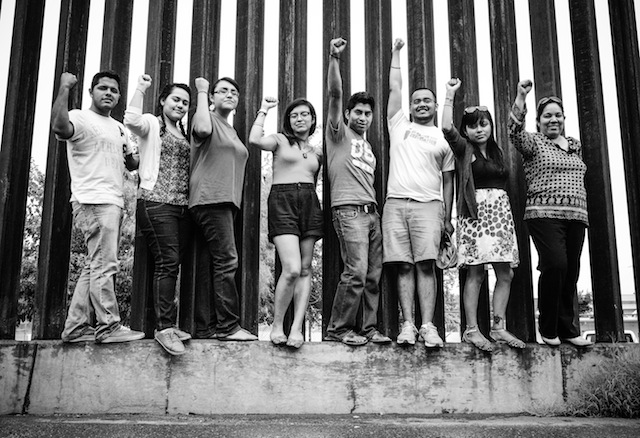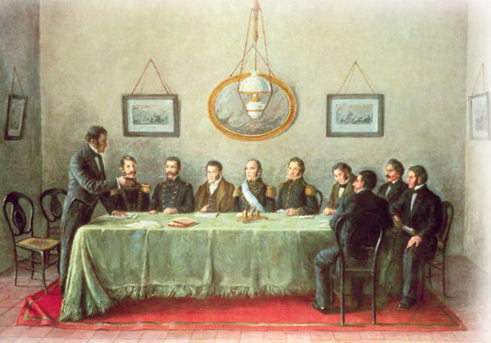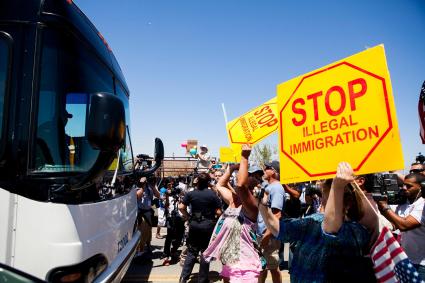US President Barack Obama’s announcement of deferred deportation for millions of irregular migrants is a wonderful gift for many American families this Thanksgiving, whatever the greater (de)merits of his executive action. Truly, the biggest regret one might have is that Obama did not go far enough. Or to put it in the way only an Onion headline can, “5 Million Illegal Immigrants To Realize Dreams Of Having Deportation Deferred.”
As I’ve written, no sane person can defend the immoral persecution which most of these immigrants living in the shadows unjustfly face. But if you haven’t considered the issue well enough, you might unfortunately produce such dross as this cartoon that recently ran in the Indianapolis Star:
 It is truly curious to me that the main reaction of the mainstream media was to label this as racist. The Indianapolis Star actually initially responded to criticism by removing the immigrant’s mustache and republishing an otherwise identical cartoon! Of all the the things wrong with this image, race is the last thing I would single out. The problem isn’t inherently its depiction of race relations; if anything, it’s hard to say without knowledge of the political context what the ethnicity of that immigrant might be. The problem is inherent to this image’s portrayal of how immigrants actually conduct themselves in society.
It is truly curious to me that the main reaction of the mainstream media was to label this as racist. The Indianapolis Star actually initially responded to criticism by removing the immigrant’s mustache and republishing an otherwise identical cartoon! Of all the the things wrong with this image, race is the last thing I would single out. The problem isn’t inherently its depiction of race relations; if anything, it’s hard to say without knowledge of the political context what the ethnicity of that immigrant might be. The problem is inherent to this image’s portrayal of how immigrants actually conduct themselves in society.
Now, the basic idea of this cartoon is pretty simple: immigrants need to ask the government for permission to settle in a new country. Without permission, these immigrants are akin to trespassers. Just as it is wrong for me to set foot in your house without your permission, it is wrong for migrants to set foot on the country’s soil without its government’s permission. In short: illegal immigration violates citizens’ “collective property rights“.
There’s a fundamental problem with this analogy, because it ignores the simple reality that irregular immigrants are not trespassers. After all, what exactly is the problem with me sitting down at your Thanksgiving dinner table, uninvited? The problem is that I am there without your permission.
So where are the immigrants sitting themselves down at dinner tables uninvited? What have they done that is the equivalent of inviting themselves over to stay at your house? The reality is that most immigrants, even those who have entered unlawfully, have done no such thing. You cannot say with a straight face that millions of people have literally invaded the homes of Americans.
The average undocumented immigrant paid for his own passage. Transportation providers — some unauthorised coyotes, others actual bus, train, or airline companies — offered these migrants a seat in return for the market rate. No trespassing or theft occurred; the transportation carriers gladly and willingly offered their services because they were compensated by these migrants. You cannot say these migrants robbed Greyhound by daring to buy a bus ticket.
What next? The migrants settled down, and began looking for work. Again, your average migrant isn’t illegally camping out in someone’s house, or sleeping on the sidewalk: your average migrant is renting a room or a home from someone. It is generally agreed that some one-third of undocumented immigrants in the US actually own their own homes! Whose property were they trespassing on when they paid their rent, or paid the market price for their own home? Who did they steal from?
You may think me obtuse: after all, the answer is that these people trespassed on the land collectively owned by all citizens of the country they’re in. But this frankly ignores the reality that the laws of the US, and most countries, recognise no such concept as collective ownership: if the land belongs to you, John Doe, then you get to decide what to do with it, as long as all applicable real estate, zoning, or tenancy laws are followed. The furthest that most democracies go is limiting the sale of land to foreigners, but in such cases, foreigners remain free to rent their own homes from citizen landlords: after all, the homes belong to the individual citizens, not to the state.
Now, am I saying that there is no public interest in managing the flow of migration, no sovereign authority competent to regulate the flow of people across borders? No; I simply hold that the authority of governments to regulate borders flows from the public interest — not “collective property rights”, which don’t exist outside of communist states which refuse to recognise an individual right to private property.
The invocation of “property rights” as an excuse to dispossess people of property they have paid for in this particular instance is particularly ridiculous, because in no other arena of public life in a modern civilised state do we see such logic trotted out. When the government bans you from building a meth lab in your backyard, nobody says the government is justified in doing this because the citizens that collectively own your land haven’t given you permission to do that. The problem with you building a meth lab on your land isn’t that you failed to obtain the necessary permission from the collective that owns it. The problem is that the public has an interest in not having their own homes burned down if your meth lab explodes.
Immigrants who actually enter with the intention to commit crime, to steal, to trespass on private property — these are immigrants the government ought to detain, punish, and perhaps exclude via deportation. There I think I and the cartoonist have no quarrel. But where we differ is that the cartoonist clearly believes those who enter with peaceful intentions, those who pay for the homes they live in and the food they eat with the wages of their own sweat, are somehow also tantamount to criminal trespassers.
It is as though you tore down the treehouse I built in my backyard, using the lame excuse that some people might build meth labs in their backyards; that if I really wanted to build a treehouse I should have waited eighty years in line for the requisite bureaucratic approvals to prove that I’m not building a meth lab; that if I don’t like waiting eight decades to jump through bullshit hoops just to go about my own quiet business, I still have no right to question this because it’s the public’s land, not my own.
When it comes to travel, there is an obvious public interest in detaining criminals, treating contagious disease-carriers, and deterring invading armies. This is equally true inside a nation’s borders as it might be true outside. The health and security of the populace are obvious public interests where governments have a role to play. To the extent that we might impose restrictions on where someone can travel, these controls are justified not by imaginary collective property rights, but by the defence of the nation against actual threats to public safety and order.
I say, if someone wants to go somewhere in peace, and is willing to pay the required fare, it’s simply none of my business where that person goes. As long as he doesn’t trespass on my home, I have no business interfering with the peaceful conduct of that person. And if that person pays market rent for a home, I certainly have no business telling that person he is a trespasser — that he ought to get out of the home he has already paid the market price for.
It is all the more shameful and regretful that this ignorant, dehumanising cartoon had to mark the festival of Thanksgiving — a traditional American holiday which commemorates the cooperation of Pilgrims who immigrated to North America with the native Americans who welcomed them. In reality, of course the picture is much less rosier than the traditional account; the Pilgrims themselves might have had peaceful intentions, but many other European colonists were certainly more invaders than immigrants. And of course there is something to be said for the accuracy of this depiction, from a New Yorker cover marking Thanksgiving a few years back:

But all the same, whatever the evils wrought by invading colonists, the people of the United States today owe their heritage to peaceful immigration. Most of their ancestors — poor Germans, Irish, Italians — came not to steal land, but to rent or buy their own homes in peace, and build a better future for their families through hard work. Thanksgiving is a holiday which at least in the popular imagination marks the American legacy of immigration — and yet ironically, sentiments like those of the Indianapolis Star cartoon endorse Soviet- or Maoist-style collectivism, the antithesis of all that the US stands for!
Amidst all those Americans who will mark this Thanksgiving by complaining about immigrants who have done nothing worse than crawl through sewers for the chance to pay market rent and earn a market wage, I hope at least some might remember the words of another President, one George Washington:
The bosom of America is open to receive not only the Opulent and respectable Stranger, but the oppressed and persecuted of all Nations And Religions; whom we shall welcome to a participation of all our rights and privileges, if by decency and propriety of conduct they appear to merit the enjoyment.
There was no qualification for who could or should be welcomed, as long as their conduct was decent. Most immigrants conduct themselves no worse than anyone else: they pay the fair price for their homes, and they expect only a fair wage for their labour. There is nothing indecent or improper about that. The janitor in your office and the line cook in your cafeteria are not invading anyone’s home. It disgraces Washington to pretend otherwise — to pretend that paying rent constitutes theft and trespassing.
People say that today is different; that things have changed. That’s not how I see it. People have always used bigotry to justify excluding innocent people from our societies, always ignorantly used prejudice to justify treating common people as though they are criminals. And people struggling to earn the dignity of a better life with honest labour have always been willing to risk it all for their dreams of a better tomorrow. It is as true today, and as true for people of all creeds and colours, as it has ever been:
Liu said he was happy to hear what his children told him one day about American history that they studied at school: “America was actually founded by people like dad who was unhappy with his home country and decided to take a boat to come to America.”
Liu said, “I heard their boat was called the May Flower. Mine was called Golden Venture.”
There may be much to regret in the history of Thanksgiving — in how many European newcomers to the Americas came as invaders, rather than peaceful immigrants. But all the same, the legacy of Thanksgiving is one of freedom of movement, freedom to search for a better life wherever your peaceful ambitions may lead you.
I am not American myself, but I am grateful today that I at least have the unearned privilege of being able to live in peace in the US. I am grateful that America’s legacy of open borders defended moral decency and civilisation from the depravity of dictatorship during World War II; that, as my German colleague Hansjoerg Walther says, American open borders changed the course of world history. I am thankful for the truly American legacy of open borders:

To all my American friends, happy Thanksgiving.



 Acuerdo de San Nicolás de los Arroyos, a treaty between different governors signed in 1852 to convene a Constitutional Convention that drafted the constitution of 1853, source
Acuerdo de San Nicolás de los Arroyos, a treaty between different governors signed in 1852 to convene a Constitutional Convention that drafted the constitution of 1853, source 

 World Press 2014 photo: Signal from Djibouti, source
World Press 2014 photo: Signal from Djibouti, source